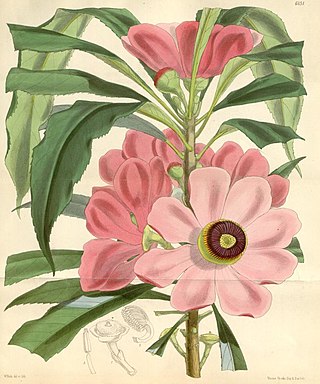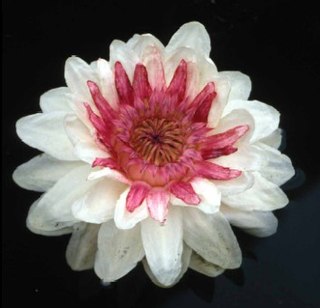Gustavia acuminata is a species of woody plant in the family Lecythidaceae. It is found in Brazil and Venezuela. It is threatened by habitat loss.
Gustavia dodsonii is a species of woody plant in the Monkeypot Family (Lecythidaceae). It is found only in Ecuador. Its natural habitats are subtropical or tropical moist lowland forests and subtropical or tropical moist montane forests. Its most remarkable feature are its seeds, which can measure up to 2.9 inches in length by up to 2.25 inches (58mm) in diameter.
Gustavia erythrocarpa is a species of woody plant in the family Lecythidaceae. It is found only in Brazil. It is threatened by habitat loss.
Gustavia excelsa is a species of woody plant in the family Lecythidaceae. It is found only in Colombia.
Gustavia foliosa is a species of woody plant in the family Lecythidaceae. It is found in Colombia and Ecuador.
Gustavia fosteri, one of several plants in the genus Gustavia known by the Spanish common name membrillo, is a species of woody plant in the family Lecythidaceae. It is found only on Barro Colorado Island in Panama. It is threatened by habitat loss.

Gustavia gracillima is a species of woody plant in the family Lecythidaceae. It is found in Colombia and Ecuador.
Gustavia latifolia is a species of woody plant in the family Lecythidaceae. It is found only in Colombia.
Gustavia longepetiolata is a species of woody plant in the family Lecythidaceae. It is found only in Brazil. It is threatened by habitat loss.
Gustavia monocaulis is a species of woody plant in the family Lecythidaceae. It is found in Colombia and Panama. It is threatened by habitat loss.
Gustavia petiolata is a species of woody plant in the family Lecythidaceae. It is found only in Colombia.
Gustavia pubescens is a species of woody plant in the family Lecythidaceae. It is found in Colombia and Ecuador.
Gustavia santanderiensis is a species of woody plant in the family Lecythidaceae. It is found in Brazil and Colombia. It is threatened by habitat loss.
Gustavia serrata is a species of woody plant in the family Lecythidaceae. It is found only in Ecuador and also Brazil. Its natural habitat is subtropical or tropical moist lowland forests.
Gustavia sessilis is a species of woody plant in the family Lecythidaceae. It is found only in Colombia.
Gustavia verticillata is a species of woody plant in the family Lecythidaceae. It is found in Colombia and Panama.

Gustavia is a genus of flowering plants in the family Lecythidaceae described by Linnaeus in 1775. It is native to tropical Central America and South America. Many of the species are threatened; some are critically endangered Gustavia superba, though, is actually abundant in re-growing secondary forests. It grows in northern South America, from Panama south through the Andes as far as Ecuador, and along the Caribbean coast and in the Amazon basin. Gustavia flowers have numerous stamens, in some species as many as 1,200 in a single flower.

The Flora of Colombia is characterized by over 28,000 species of green plants.
The territory of Saint Barthélemy consists of Saint Barthelemy and the near islands.

Saint Barthélemy, officially the Collectivité territoriale de Saint-Barthélemy, also known as St. Barts (English) or St. Barth (French), is an overseas collectivity of France in the Caribbean. The island lies about 30 kilometres (19 mi) southeast of the island of Saint Martin; it is northeast of the Dutch islands of Saba and Sint Eustatius, as well as north of the independent country of Saint Kitts and Nevis.




